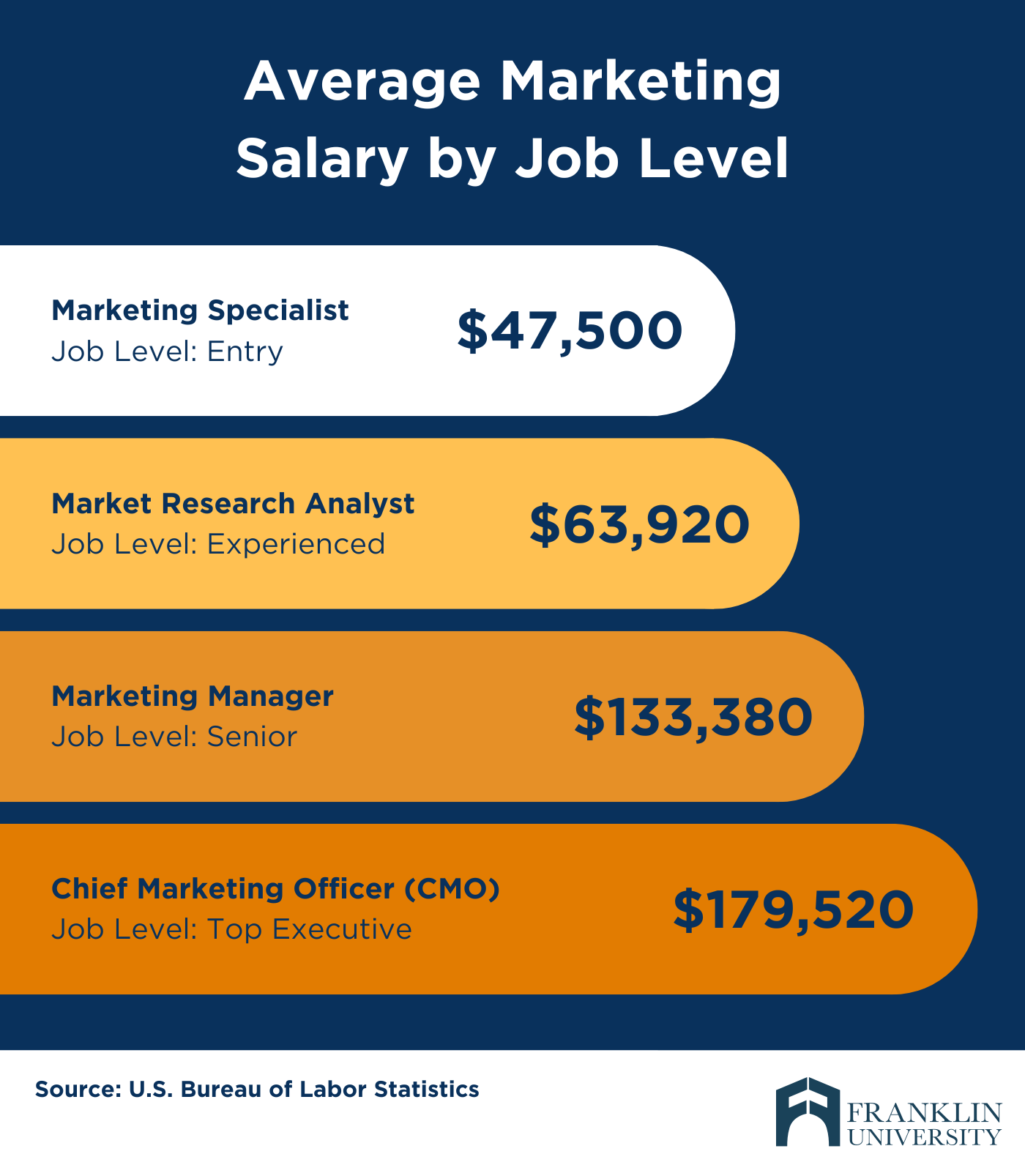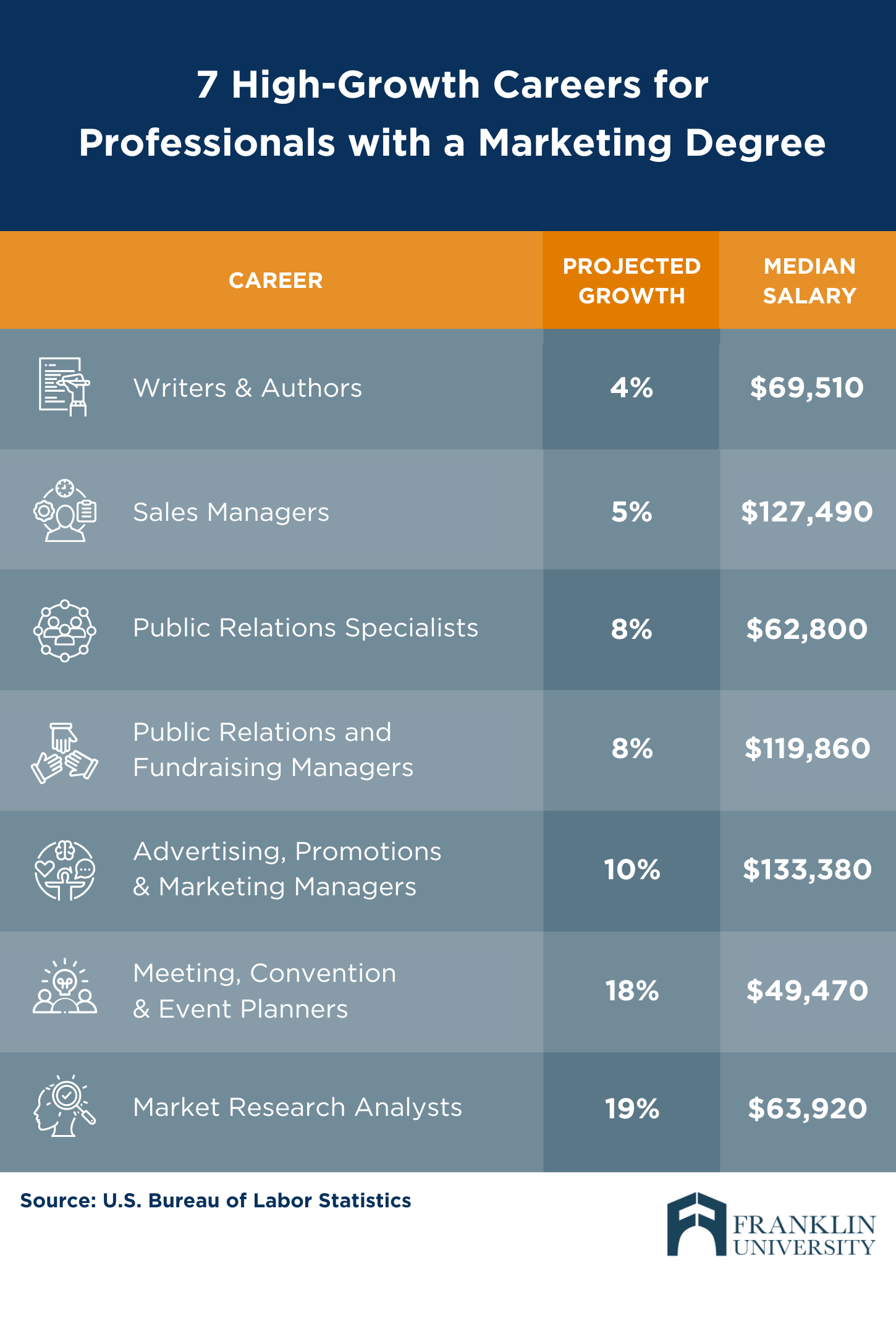Request Information
We're Sorry
There was an unexpected error with the form (your web browser was unable to retrieve some required data from our servers). This kind of error may occur if you have temporarily lost your internet connection. If you're able to verify that your internet connection is stable and the error persists, the Franklin University Help Desk is available to assist you at helpdesk@franklin.edu, 614.947.6682 (local), or 1.866.435.7006 (toll free).
Just a moment while we process your submission.

Is a Marketing Degree Worth it? 6 Reasons the Answer Is 'Yes'
Changes in technology, buyer habits and the economy continue to change the marketing landscape. Companies are challenged with navigating constant change while also seizing the opportunities these new realities can bring.
That’s why marketing careers are rising in both prevalence and popularity. In fact, according to labor analytics firm Lightcast, in 2022, there were more than 4.95 million jobs in marketing with an annual median salary of $80,800. Lightcast also reports that there’s an expected job growth opportunity of 16.3% to 2032.
Forward-thinking companies in all sectors across all industries, including some of the world’s most-well known brands (Amazon, Humana and Wells Fargo, to name a few), need savvy, well-prepared marketing professionals to help them thrive.
So, how can you master the technical, creative and interpersonal skills needed for an exciting career in marketing? By earning a bachelor’s in marketing degree or an MBA with a marketing specialization.
What Is a Marketing Degree and Why Does It Matter?
A marketing degree is an undergraduate- or graduate-level degree that focuses on one of the most creative parts of business. Because marketing affects almost every aspect of daily life, the marketing degree program focuses on the development and application of creativity, communication, and analytical skills to address organizational challenges and leverage opportunities.
When you enroll in a high-quality marketing degree program at an accredited university, you’ll study a wide variety of topics, including market research, consumer behavior and messaging.
6 Reasons You Really Need a Marketing Degree
1. You want to work in marketing but don’t have much experience.
Earning a marketing degree is so much more than learning about advertising or selling. With the right degree program, you’ll learn foundational marketing principles and constructs, including how to develop and execute a strategy and how to communicate ideas with influence.
You’ll develop a strong understanding of other business disciplines, including operations, human resources, accounting, finance and technology. More importantly, you’ll learn how they work together for the success of an organization.
You’ll also explore current best practices and industry-standard tools, preparing you to apply what you learn to real-world situations.
In addition to setting you apart from others who are competing for career-beginning generalist marketing positions, your marketing degree will prepare you for specialized roles in digital marketing, search engine optimization and social media.
2. You want to learn in-demand marketing skills.
Because marketing is an ever-changing field, it’s important to keep up with emerging trends and current techniques, ranging from digital advertising and marketing automation to AI and augmented reality.
A marketing degree can help you deepen your understanding of the discipline so you’ll be better equipped to help organizations create targeted, data-driven, multi-channel marketing initiatives.
- Product Marketing & Go-to-Market Strategy
Marketing is all about bringing awareness to a product, service or organization. A marketing degree can prepare you to understand target audiences, analyze relevant information to make informed decisions, and develop campaigns that spread the word about new or improved products and services. - Project Management
Effective marketing is impossible without a well-executed plan that includes timelines, workflows, budgets and someone to manage it all. A marketing degree can help you develop the skills needed to ensure on-time, on-budget and on-brand deliverables. - Product Roadmaps
Every “how” starts with “what” and “why.” In marketing, that’s the purpose of the product roadmap and the reasons your marketing degree will teach you how to develop this all-important strategic guide. - Digital Marketing
Paid digital marketing across search engines and social networks dominates the marketing budget. A degree in marketing can help you learn how to create paid campaigns, target audiences, and develop creative assets to deliver success on time and on budget. - Strategic Marketing Management
In marketing, being able to identify and develop strategic plans that drive growth is essential. With a marketing degree program, you’ll learn how to translate data-driven insights into opportunities to engage customers.
3. You’re an entrepreneur (or want to be) that needs to know how to market your business.
According to the Global Entrepreneurship Monitor (GEM) 2021/22 USA National Report, there are 33.5 million entrepreneurs starting or running new businesses, along with another 18 million running established businesses.
If you are or plan to be one of them, it’s essential that you understand your customer and how to reach them with your product or service in a way that appeals to them.
As an entrepreneur with a marketing degree, you can expect to be more effective at branding your business, promoting your offerings, and reaching the right customers at the right time with the right message.
As an added bonus, a quality marketing degree program will provide you with core knowledge of other essential business functions, including accounting, finance, and management.
4. You want a better salary, more responsibility or career advancement.
Perhaps even more important than helping you land a job is the fact that a marketing degree can boost your chances for a better salary, more responsibility or career advancement. According to the U.S. Bureau of Labor Statistics (BLS), education pays.
The BLS reports that as education levels go up so, too, does salary, while unemployment rates go down.
So, whether you’re looking to make more money, take on new responsibilities in your current role, or move up to a higher-level position, a marketing degree can help.

5. You want to pivot your career.
If you’re looking to change careers, you’ll be expected to have, at minimum, broad-based knowledge of marketing and, preferably, deeper knowledge of a subspecialty within marketing.
So, even if you have professional experience or a degree in another field, a bachelor’s or master’s degree in marketing can help you demonstrate your expertise. Plus, the right marketing degree program will give you the opportunity to build a portfolio of projects that showcase your work to a current or future employer.
6. You’re looking for a job you love in a fun, challenging environment.
Marketing is integral to the success of any business, no matter the industry or business model. What does that mean for you if you earn a marketing degree? It means you’ll have a wide variety of career paths available to you.
In general, marketing professionals gravitate toward one of two sides of the profession: client or agency. On the client side, you’ll work in a marketing department of a company, diving deep into their business, products and services to create compelling campaigns that align with strategic business goals. On the agency side, you’ll work on a wider variety of projects with numerous clients, essentially acting as a marketing consultant.
Either way, a marketing degree can help you find an exciting, ever-changing career that makes work feel more like play.
When it comes to paying for school, grants are among your best options. But do you know how to find them? Remove the guesswork by downloading this free guide
7 High-Growth Career Opportunities You Can Get with a Marketing Degree
Here’s a look at seven high-growth opportunities in marketing, along with their salaries and project job growth to 2031.

- Projected Growth: 4%
- Median Salary: $69,510
- Projected Growth: 5%
- Median Salary:$127,490
- Projected Growth: 8%
- Median Salary: $62,800
Public Relations and Fundraising Managers
- Projected Growth: 8%
- Median Salary: $119,860
Advertising, Promotions & Marketing Managers
- Projected Growth: 10%
- Median Salary: $133,380
Meeting, Convention & Event Planners
- Projected Growth: 18%
- Median Salary: $49,470
- Projected Growth: 19%
- Median Salary: $63,920
A Marketing Degree Is Essential
Ultimately, earning a marketing degree can increase both your skills and confidence–and that can set you up for a high-growth, high-paying career.
Of course, you‘ll need to take a closer look at your current skills and interests, as well as explore degree programs to find the right one for you.
If you’re one of those people with a goal to turn your passions into a successful and exciting career, hard work and a marketing degree from an accredited online university can help you make it happen.





